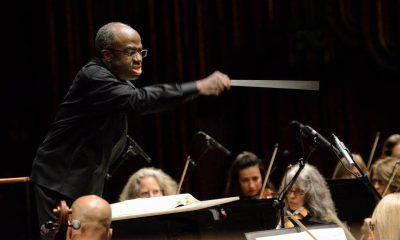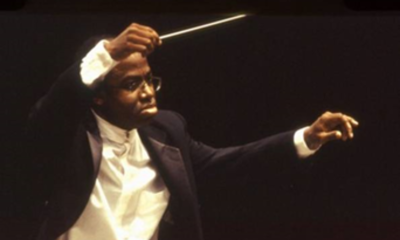Arts and Culture
The SF Symphony Passes Baton to Esa-Pekka Salonen

In 2020, Michael Tilson Thomas is turning over the San Francisco Symphony baton to Esa-Pekka Salonen, the much sought-after Finnish conductor/composer, who led the orchestra on Martin Luther King weekend in a program featuring the West Coast premiere of Anna Thorvaldsdottir’s Metacosmos (2017), Richard Strauss’ Also sprach Zarathustra (1896), and Four Legends from the Kalevala (1896) by Jean Sibelius, a fellow Finn.
Salonen is a proponent of contemporary music, and advocates for diversity in the present and future of orchestral music. Program notes quote Esa-Pekka as saying “[We] should be leading the way…using all the possibilities that new technology offers without losing the integrity of the organization, which is, of course, to perform orchestral music—live performances for live people”. Sunday’s show was a good preview into this dynamic musician’s vision about the future of symphonic music.
Pre-concert excitement was enhanced by a clear day (the first sunshine after weeks of rain), and folks buzzing around the Tuning Fork Café and Loge Bar. Dozens milled about the Symphony Store where leather bags, shawls, and decorated stainless steel water bottles presented themselves for purchase as apt mementos for this special day.
As the bassoon and oboe tuned up, evoking hints of Metacosmos, smiling ushers greeted audience members including two young women studying instrumental music, a mid-40s gentleman decked out in red pants and an orange REI parka, and a patron so enthusiastic that she sat up with perfect posture for much of the program, literally on the edge of her seat. Though the house was not entirely full of people, it was brimming with energy, and a grand round of applause welcomed Salonen as he acknowledged the audience before beginning Metacosmos with an almost imperceptible lamenting sound. This piece is not for everyone; there are many minor seconds, wandering phrases, sudden dynamic shifts, and such innovations as a percussionist using his fingers to scratch a giant snare drum. Some passages evoked Barber’s Adagio for Strings as did the Strauss which was to follow. When the memory of the first violin’s final note faded, Salonen was greeted with tremendous applause and an excited chatter filled the hall.
Also, sprach Zarathustra was conducted in a beautifully effective manner as well, pianissimos requested with the minutest movement from the baton. This piece is beautiful in its power, and Salonen conducted with such energy that I wondered if he would jump out of his shoes, which were as shiny as the gleaming organ pipes above the orchestra.
The second half felt less inspired and lacking in energy; whether that was the result of much similitude in the program, or in this reviewer’s drowsiness brought on by a warm seat and beautiful tones is not clear, but it did seem that this was the place where the musicians had a little more trouble reading Salonen’s gestures as he led them through Sibelius’ four movements full of nuance. The oboes were fantastic in this piece—and, indeed, all afternoon— and there were a few particularly nice moments from the strings, including several quite moving cello solos.
Esa-Pekka conducts with finesse, passion, and creativity. It was a joy to watch him take the baton in this exciting preview of the future of the San Francisco Symphony. His communication of, and the orchestra’s response to everything from a delicate grace to the most crisp energy was a nice peek into what seems to be a symbiotic interaction between this Music Director Designate and his new symphony orchestra.
One final note: while many in the Bay Area spent the weekend celebrating the legacy of Dr. King, it was disconcerting to observe that the orchestra and most in attendance were ethnically monochromatic. I hope that Esa-Pekka will be a driving force in helping expand ethnic, cultural, and socio-economic inclusion and diverse participation in San Francisco’s orchestral music scene.
* Anne Daniel is a conductor with the Piedmont East Bay Children’s Choir
Arts and Culture
Kedrick Armstrong: New Music Director for the Oakland Symphony
The Oakland Symphony Announced Kedrick Armstrong as its Next Music Director. In addition to conducting the orchestra’s public concerts, Armstrong will also actively participate in the Oakland Symphony’s many education and community engagement programs, designed to inspire a love of music in people of all ages.
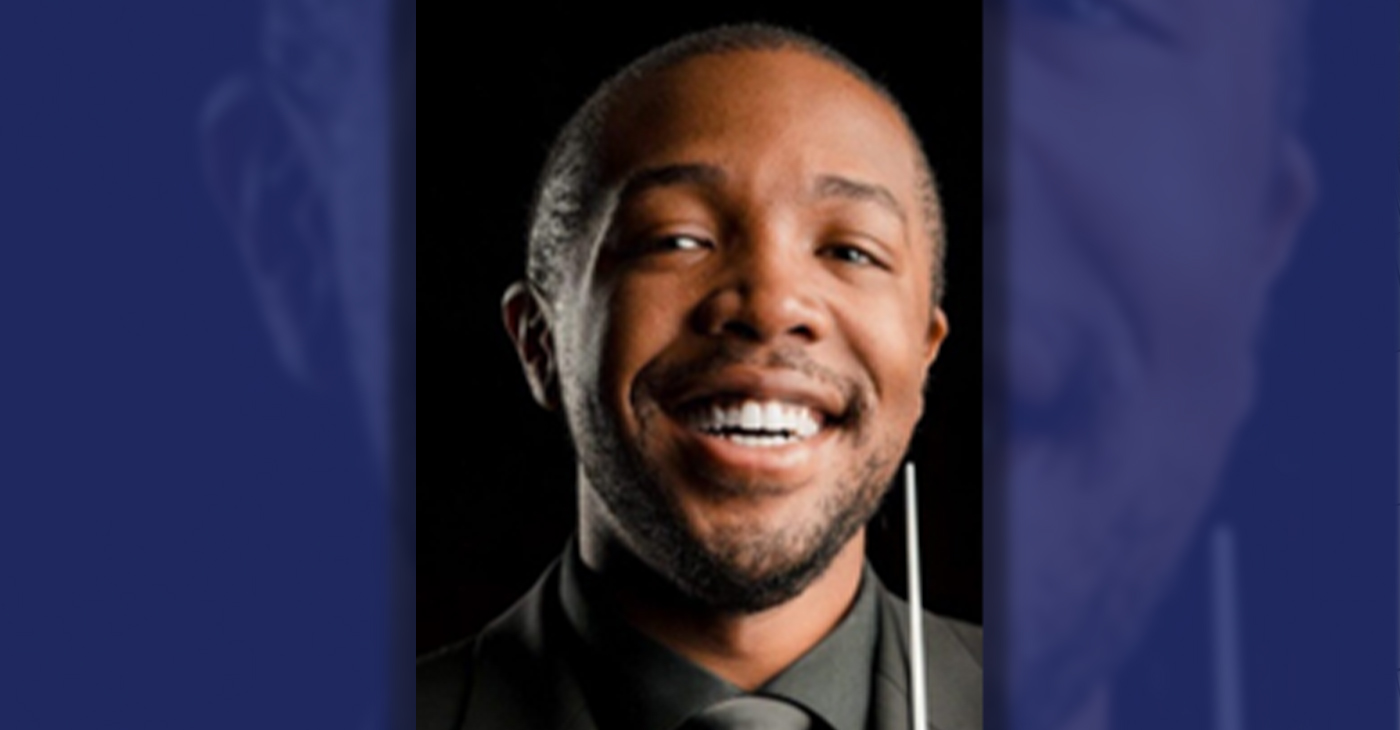
By Post Staff
The Oakland Symphony Announced Kedrick Armstrong as its Next Music Director.
In addition to conducting the orchestra’s public concerts, Armstrong will also actively participate in the Oakland Symphony’s many education and community engagement programs, designed to inspire a love of music in people of all ages.
Armstrong is the successor to previous music director and Conductor Michael Morgan, who passed away in 2021 after a 30-year tenure at the Symphony.
Armstrong will open the Oakland Symphony 2024-2025 season on October 18.
Armstrong, who is 29 and hails from Georgetown, South Carolina, is currently the creative partner and principal conductor of the Knox-Galesburg Symphony.
The Chicago Tribune has praised Armstrong for his ability to “simply let the score speak for itself.” He enjoys a wide range of repertoire, spanning early music to premiering new works, using his joy and curiosity for all music to cultivate understanding and collaboration within diverse communities.
“I am deeply honored and grateful for the opportunity to serve as the new music director of the Oakland Symphony,” Armstrong said. “As a Black conductor, I find it humbling to stand on the shoulders of both Michael Morgan and Calvin Simmons,” the most recent and the first African American music directors of the Symphony, respectively.
Armstrong led three programs at the Symphony between 2022 and early 2024, which showcased his broad knowledge of the classical repertoire and enthusiasm for spotlighting diverse voices.
On his Oakland Symphony subscription debut on Feb. 16, Armstrong led the world premiere of “Here I Stand: Paul Robeson,” an oratorio by Carlos Simon on a libretto by Dan Harder, commissioned by the Oakland Symphony.
Armstrong was selected unanimously by the Oakland Symphony’s board of directors and musicians after an extensive two-year search. “The search committee was overwhelmed by Kedrick’s scholarship and curiosity about all kinds of music, from classical and jazz to gospel and hip-hop,” said. Dr. Mieko Hatano, executive director of the Oakland Symphony. “We are thrilled to have him join us at the Oakland Symphony.”
Arts and Culture
Faces Around the Bay Dr. Carl Blake, Pianist
Born in Liberty, Missouri, Carl Blake, a virtuoso and respected pianist, made his most recent migration to the East Bay in 1999. One might have seen him performing recently at Noontime Concerts in San Francisco, or at the Piedmont Center for the Arts in Oakland. He is Director of Music at The Church for the Fellowship of All Peoples in San Francisco. He was also co-organizer and collaborative pianist at Herbst Theater for The Majesty of the Spirituals concert in 2022 and has held several church positions in the Bay Area.
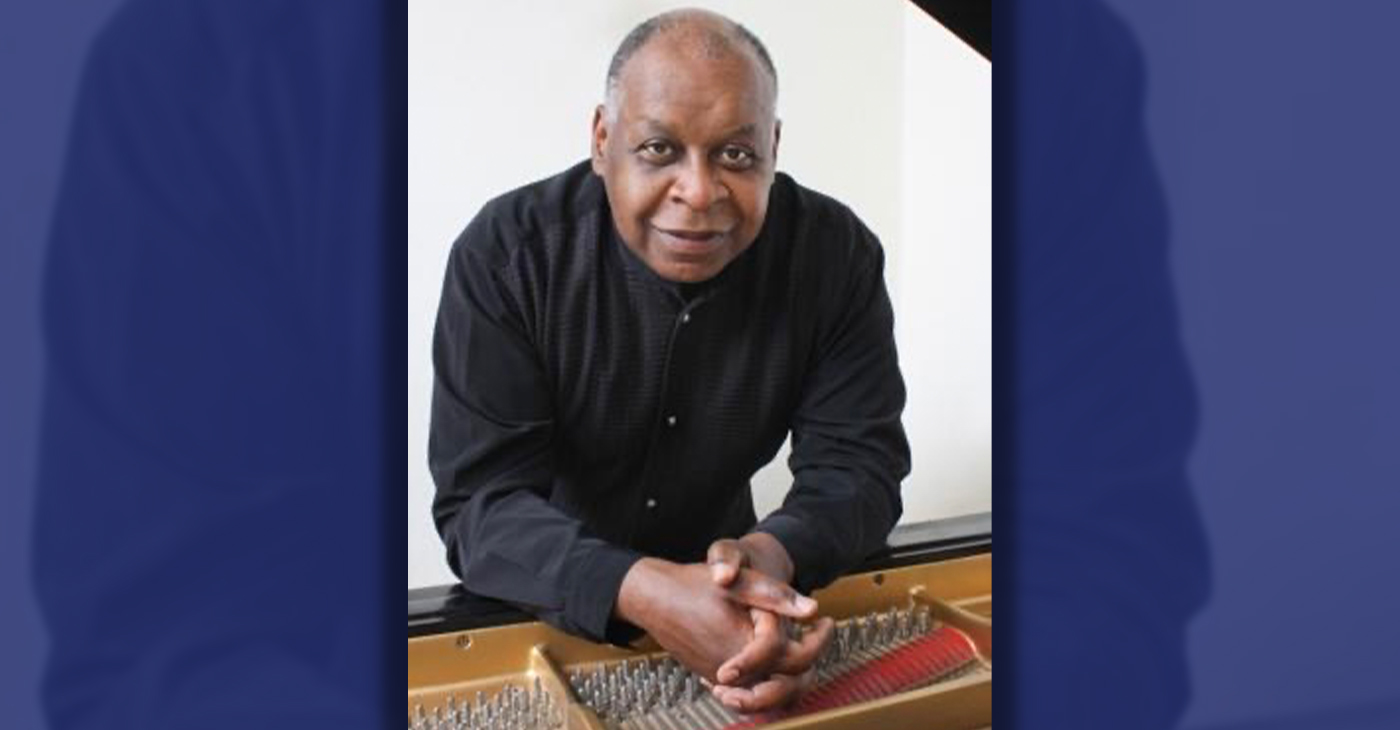
By Barbara Fluhrer
Born in Liberty, Missouri, Carl Blake, a virtuoso and respected pianist, made his most recent migration to the East Bay in 1999.
One might have seen him performing recently at Noontime Concerts in San Francisco, or at the Piedmont Center for the Arts in Oakland. He is Director of Music at The Church for the Fellowship of All Peoples in San Francisco. He was also co-organizer and collaborative pianist at Herbst Theater for The Majesty of the Spirituals concert in 2022 and has held several church positions in the Bay Area.
Blake obtained a Bachelor of Music from Boston University and continued post-baccalaureate studies in Jamaica before earning a Master of Arts in Music at San Jose State University. He was the recipient of two Fulbright residencies in Honduras and completed a third residency at the University of St. Petersburg in Russia. He has a Doctor of Musical Arts from Cornell University.
At age 19, Blake, then an undergraduate piano major at Boston University, was “discovered” by Impresario Dr. W. Hazaiah Williams, who is the Founder and Director of Today’s Artists/Four Seasons Arts.
Williams honored Blake by awarding him the first Marian Anderson Young Artist Award. Anderson personally presented the award at the Masonic Auditorium in S.F. Subsequently, Blake was presented by Dr. Williams in his San Francisco debut at The Herbst Theatre. Williams subsidized a year of study abroad for Blake at the Paris Conservatory of Music. Additionally, Williams sponsored Blake’s New York Weill Hall debut, where he has performed twice since. Blake performed several times at the Yachats Music Festival in Oregon.
Blake continues to perform nationally and abroad. His hobbies are reading, baking and travel. He says, “I’m still pumping ivories, as Belgian pianist Jeanne Stark described the disciplined practice of concert piano.”
Arts and Culture
Oakland Jazz Great Offers Master Class as City Declares “John Handy Day”
World-renowned jazz master saxophonist John Handy, a McClymond’s High School graduate, was presented with a Mayor of Oakland Proclamation declaring Feb. 12, as John Handy Day in the city. Handy is most notably known as the featured saxophonist for Charles Mingus on “Goodbye Pork Pie Hat” from the album “Mingus Ah Um” (1959) and on “Hard Work” from his own album “Hard Work” (1976).
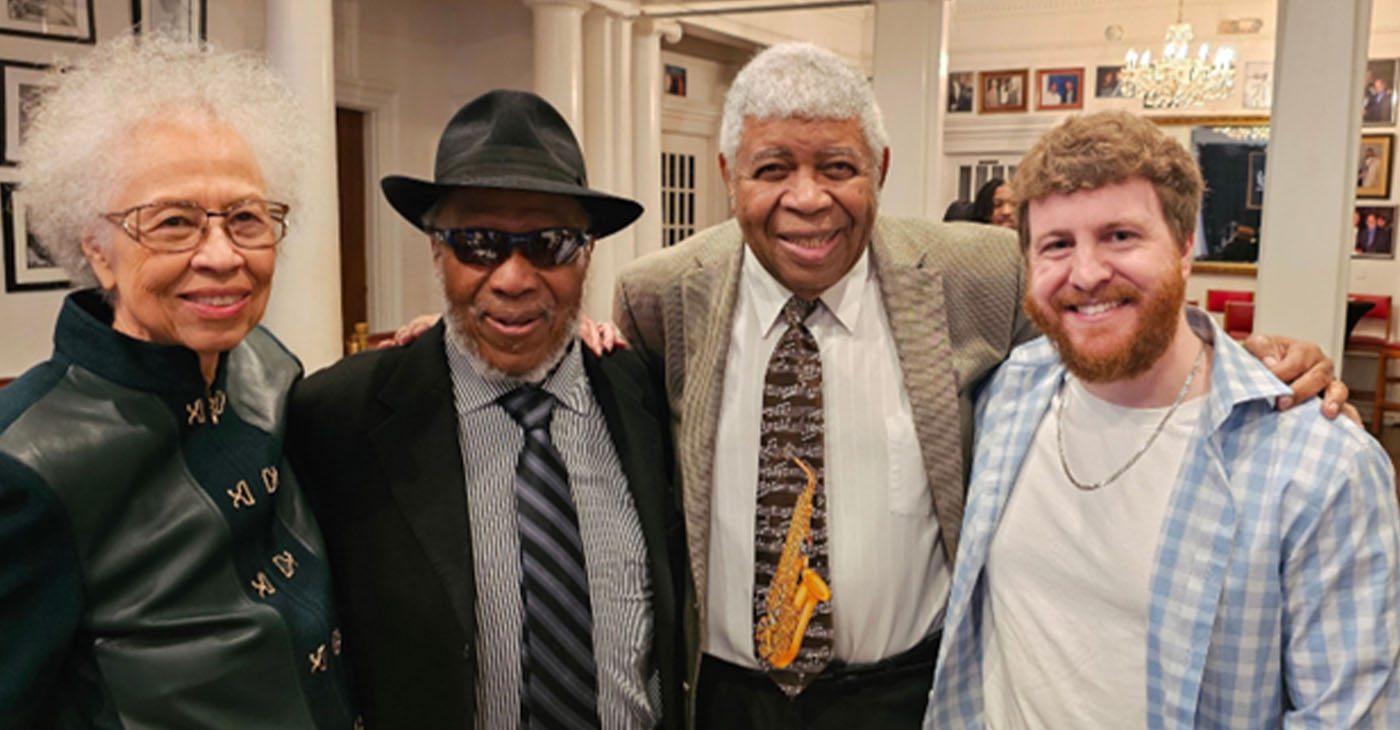
By Conway Jones
World-renowned jazz master saxophonist John Handy, a McClymond’s High School graduate, was presented with a Mayor of Oakland Proclamation declaring Feb. 12, as John Handy Day in the city.
Handy is most notably known as the featured saxophonist for Charles Mingus on “Goodbye Pork Pie Hat” from the album “Mingus Ah Um” (1959) and on “Hard Work” from his own album “Hard Work” (1976).
“John Handy is a jazz icon and an inspiration to musicians everywhere,” said Ayo Brame, a 16-year-old Oakland tenor saxophone player who is enrolled at the Oakland School for the Arts.
In celebration of this day, the reception in downtown Oakland at Geoffrey’s Inner Circle was a gathering of artists, young and old, coming together in his honor and celebrating his 91st birthday.
Handy presented a Saxophone Colossus free masterclass for musicians. This class afforded a rare opportunity to learn about the saxophone from an aficionado. The class was free and open to all – saxophonists, vocalists, aficionados, students, and casual listeners.
“As a longtime friend for over 60 years, and fellow musician who has had numerous opportunities to share the stage with John, it has always been a pleasure performing with him and hearing his creative interpretations of the music and his gift of ease inspiring the next generation of jazz musicians,” said Roger Glenn, a multi-instrumentalist.
-

 Activism4 weeks ago
Activism4 weeks agoOakland Post: Week of March 27 – April 2, 2024
-

 #NNPA BlackPress4 weeks ago
#NNPA BlackPress4 weeks agoCOMMENTARY: D.C. Crime Bill Fails to Address Root Causes of Violence and Incarceration
-

 #NNPA BlackPress4 weeks ago
#NNPA BlackPress4 weeks agoMayor, City Council President React to May 31 Closing of Birmingham-Southern College
-

 #NNPA BlackPress4 weeks ago
#NNPA BlackPress4 weeks agoBeloved Actor and Activist Louis Cameron Gossett Jr. Dies at 87
-

 Community1 week ago
Community1 week agoFinancial Assistance Bill for Descendants of Enslaved Persons to Help Them Purchase, Own, or Maintain a Home
-

 Activism3 weeks ago
Activism3 weeks agoOakland Post: Week of April 3 – 6, 2024
-

 Business1 week ago
Business1 week agoV.P. Kamala Harris: Americans With Criminal Records Will Soon Be Eligible for SBA Loans
-

 Activism2 weeks ago
Activism2 weeks agoOakland Post: Week of April 10 – 16, 2024


